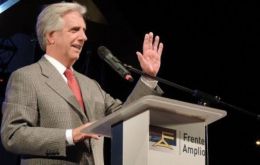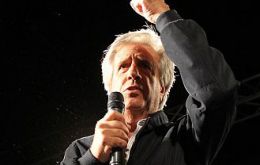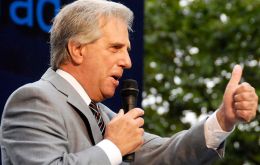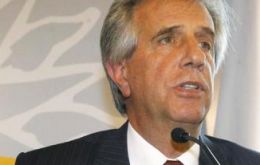MercoPress. South Atlantic News Agency
Tag: Pedro Bordaberry
-
Tuesday, October 28th 2014 - 07:03 UTC
Uruguay's ruling Broad Front headed for parliamentary majority

Uruguay's ruling Broad Front coalition, despite pollster forecasts to the contrary, confirmed their dominance of local politics and are likely to enjoy a parliamentary majority, after the Sunday presidential election that left Tabare Vazquez as favorite to succeed José Mujica as head of state.
-
Monday, October 27th 2014 - 06:46 UTC
Bordaberry pledges support for Lacalle Pou in the 30 November runoff

Pedro Bordaberry, the Colorado party presidential candidate who did not make it to the runoff in Uruguay's Sunday election, announced the country 'urgently needs changes' and in this new scenario National party candidate Luis Lacalle Pou is the option.
-
Monday, October 27th 2014 - 06:31 UTC
Uruguayan presidential run-off on 30 November; ruling coalition ruins pollsters forecasts

Uruguayan pollsters again seem to have missed their target regarding estimate results of Sunday's legislative and presidential elections: the ruling Broad Front coalition presidential candidate Tabare Vazquez took a strong lead in the exit polls, and although he will be forced to a run-off with runner up Luis Lacalle Pou as anticipated, the percentage numbers indicate he should be able to achieve a comfortable win at the end of November, contrary to what was forecasted.
-
Friday, October 24th 2014 - 07:19 UTC
Uruguayan candidates end campaigns with their minds on a November runoff

The three main presidential candidates for Uruguay's Sunday 26 October election closed their campaigns on Thursday evening with three huge political rallies that gathered thousands of militants and put an end to months of travel, speeches, flesh pressing and baby kissing, in what could prove to be the tightest race in recent years.
-
Thursday, October 23rd 2014 - 06:23 UTC
Uruguay pollsters agree on a runoff and divided parliament, on Sunday' election

The last round of public opinion polls in anticipation of Uruguay's Sunday general election (Executive and legislative), released on Wednesday evening by the main television channels, shows that the next government will not enjoy a majority in congress and there will be a presidential runoff at the end of November.
-
Wednesday, October 8th 2014 - 08:24 UTC
Uruguay presidential race to be decided in runoff in November seems confirmed by latest poll

A run off in November to elect Uruguay's president seems most certain because none of the two leading candidates will manage a majority in the first round on 26 October, according to the latest public opinion poll.
-
Tuesday, September 9th 2014 - 04:57 UTC
Opposition parties five points ahead of Uruguay's ruling coalition for October election

With less than fifty days to national elections when Uruguayans will vote for president and a new parliament (26 October), public opinion polls indicate that the ruling coalition until a few months ago the undisputed winner, faces a runoff and whoever wins will have to rule with a divided legislative.
-
Friday, June 13th 2014 - 08:37 UTC
Uruguay's main parties completed their presidential tickets for 26 October

Uruguay's ruling coalition and the main opposition National party have finally worked out their presidential tickets for October's general election, following on the results, and subsequent negotiations, of the June first primary elections.
-
Monday, June 2nd 2014 - 07:13 UTC
Vazquez, Lacalle Pou and Bordaberry: one the three will be Uruguay's next president

Sunday's primaries in Uruguay cleared the way for the candidates of the four parties with legislative representation that will be disputing the presidential election next October 26, with a run-off a month later if none of them manages 50% plus one of ballots.
-
Wednesday, March 19th 2014 - 07:30 UTC
A Vazquez victory forecasted in Uruguay but with 'orthodox economics' threatened

The Economist Intelligence Unit anticipates a 2015 scenario in which Tabaré Vazquez from the ruling coalition will most probably be president, but in a situation quite different from that of his first mandate (2005/2010) if he insists in implementing orthodox economics.
